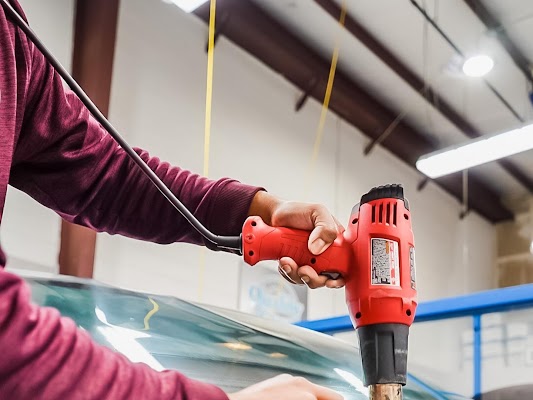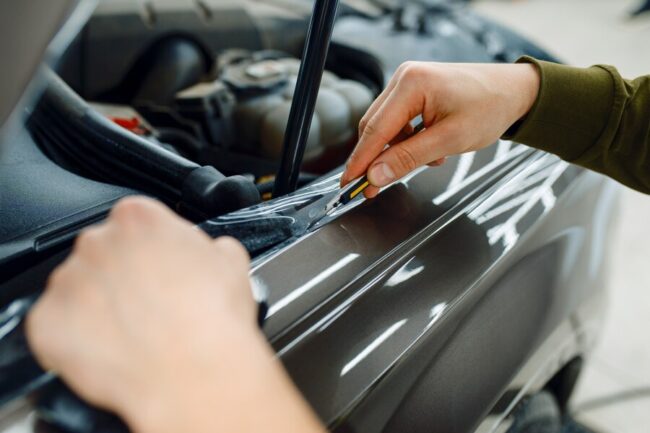In the realm of industrial operations, where machinery and equipment play a pivotal role in ensuring seamless production, the need for robust protective measures becomes paramount. One such technological advancement that has garnered significant attention is ceramic coating. Industrial environments subject machinery to harsh conditions such as extreme temperatures, corrosive chemicals, and abrasive materials, leading to wear and tear that can impede efficiency and longevity. Enter ceramic coatings – a cutting-edge solution designed to provide a durable shield against these adversities. Beyond aesthetics, the application of ceramic coatings in the industrial sector holds immense promise, offering a multifaceted approach to safeguarding machinery and equipment, ultimately enhancing their performance and extending their operational lifespan.
Ceramic coatings for industrial use represent a revolutionary leap in protective technologies, leveraging the exceptional properties of ceramics to create a resilient barrier on the surfaces of machinery. These coatings are engineered to resist corrosion, abrasion, and thermal stress, making them indispensable for applications across diverse industrial sectors. As industries increasingly recognize the value of proactive maintenance and longevity in their equipment, the adoption of ceramic coatings emerges as a strategic investment in the seamless and efficient functioning of critical machinery, ultimately contributing to enhanced productivity and cost-effectiveness in the industrial landscape.
The Evolution Of Ceramic Coatings In Industry
Over the years, the industrial landscape has witnessed a remarkable evolution in the realm of protective technologies, and ceramic coatings have emerged as a significant player in this transformative journey. Initially developed for niche applications, the adoption of ceramic coatings has steadily grown, driven by their unparalleled ability to shield machinery and equipment from the harshest industrial conditions. This evolution can be attributed to the continuous advancements in material science and manufacturing processes, which have enabled the refinement and optimization of ceramic coating formulations.
As industries faced escalating challenges such as corrosive environments, extreme temperatures, and abrasive substances, the demand for robust protective solutions grew exponentially. The evolution of ceramic coatings reflects a strategic response to these challenges, providing a versatile and durable alternative to traditional protective measures. From the early stages of experimentation to the present, where ceramic coatings are integral to industrial maintenance strategies, this evolution underscores the dynamic nature of industrial technology. As ongoing research and development efforts push the boundaries of material science, the evolution of ceramic coatings in industry remains a fascinating narrative of innovation meeting the demands of a rapidly changing industrial landscape.
Mechanical Guardians: Understanding The Protective Mechanisms
In the realm of industrial fortification, ceramic coatings stand as formidable “Mechanical Guardians,” equipped with a repertoire of protective mechanisms that elevate them to the forefront of industrial shielding technologies. These coatings boast a multifaceted approach to safeguarding machinery and equipment, and understanding their protective mechanisms is crucial for industries seeking robust solutions.
 Chemical Resistance: Ceramic coatings form an impermeable barrier, resisting the corrosive effects of chemicals commonly encountered in industrial settings.
Chemical Resistance: Ceramic coatings form an impermeable barrier, resisting the corrosive effects of chemicals commonly encountered in industrial settings.- Hardness and Durability: With exceptional hardness, ceramic coatings provide a durable shield against physical abrasion and wear, ensuring the longevity of machinery surfaces.
- Heat Resistance: The ability to withstand high temperatures makes ceramic coatings ideal for applications where machinery faces thermal stress, preventing damage and degradation.
- Adhesion and Precision Application: The coatings adhere firmly to surfaces, allowing for precise application, ensuring comprehensive coverage and uniform protection.
- Low Friction Properties: Some ceramic coatings exhibit low friction characteristics, reducing wear and improving the overall efficiency of moving parts.
These protective mechanisms collectively contribute to the role of ceramic coatings as Mechanical Guardians, offering a reliable defense against the diverse challenges posed by industrial environments.
Resistance To the Elements: Corrosion Shielding Properties
In the demanding world of industrial operations, where machinery is frequently exposed to corrosive elements, the significance of corrosion-resistant coatings cannot be overstated. Ceramic coatings stand out for their exceptional resistance to corrosion, providing a robust shield against the detrimental effects of harsh chemicals, environmental factors, and corrosive agents. The inherent properties of ceramics, such as their non-reactive nature and high chemical stability, make them an ideal choice for safeguarding critical surfaces from corrosion.
- Chemical Inertness: Ceramic coatings resist chemical reactions, preventing corrosive substances from compromising the integrity of machinery surfaces.
- Oxidation Resistance: The coatings offer excellent protection against oxidation, ensuring prolonged durability even in environments with high oxidative stress.
- Acid and Alkali Resistance: With resistance to both acidic and alkaline substances, ceramic coatings provide comprehensive protection in diverse industrial settings.
- Salt Spray Resistance: Industries exposed to saline environments benefit from ceramic coatings, which effectively shield against salt spray-induced corrosion.
- Long-Term Durability: The corrosion-resistant properties contribute to the long-term durability of machinery, reducing maintenance costs and downtime.
In essence, the corrosion shielding properties of ceramic coatings not only extend the lifespan of industrial equipment but also play a crucial role in maintaining operational efficiency in challenging and corrosive environments.
Tough as Nails: Abrasion Resistance in Industrial Applications
In the demanding landscapes of industrial operations, where machinery faces relentless wear and tear, the significance of abrasion resistance cannot be overstated. Ceramic coatings stand out as an exceptional solution, exhibiting a toughness that rivals the resilience of industrial equipment. These coatings form a protective shield, effectively reducing the impact of abrasive materials encountered during daily operations. By mitigating abrasion, ceramic coatings not only preserve the aesthetic appeal of machinery but also ensure the structural integrity of critical components. This fortification against wear extends the operational lifespan of equipment, minimizing downtime and repair costs. Industries reliant on heavy machinery, such as manufacturing and construction, benefit immensely from the abrasion-resistant properties of ceramic coatings, experiencing heightened efficiency and prolonged equipment functionality.
Thriving in Heat: Thermal Stress Management with Ceramic Coatings
In the high-temperature environments synonymous with many industrial processes, the ability to manage thermal stress becomes pivotal for equipment longevity and performance. Ceramic coatings emerge as a formidable ally in this realm, equipped with the capacity to thrive in intense heat conditions. These coatings act as thermal barriers, effectively dissipating and resisting the impact of elevated temperatures on machinery surfaces. By preventing thermal stress-induced damage, ceramic coatings contribute significantly to the preservation of equipment functionality. Industries dealing with processes like metalworking, glass manufacturing, and foundries find immense value in the heat-resistant nature of ceramic coatings, ensuring that their machinery can withstand extreme temperatures without compromising structural integrity or efficiency. The application of ceramic coatings thus becomes a proactive strategy in enhancing the resilience of industrial equipment against thermal challenges.
Application Techniques: Precision In Safeguarding Machinery Surfaces
The efficacy of ceramic coatings in safeguarding machinery surfaces lies not only in the quality of the coating itself but also in the precision of application techniques. Implementing these coatings requires a meticulous approach to ensure optimal coverage and long-lasting protection. Professional applicators employ a variety of methods, taking into consideration the specific needs of each industrial setting and the intricacies of machinery surfaces.
 Surface Preparation: Thorough cleaning and preparation of machinery surfaces precede the application, removing contaminants and creating an ideal substrate for coating adhesion.
Surface Preparation: Thorough cleaning and preparation of machinery surfaces precede the application, removing contaminants and creating an ideal substrate for coating adhesion.- Spraying Techniques: Airless spray systems are commonly employed for even and consistent coating application, ensuring that every nook and cranny is effectively covered.
- Multiple Layers: Coating experts often apply multiple layers to enhance the protective barrier, with each layer contributing to increased resistance against abrasion, corrosion, and thermal stress.
- Curing Process: Precision extends to the curing process, where controlled temperature and humidity conditions facilitate the proper bonding of the ceramic coating to the machinery surfaces.
- Quality Control: Rigorous quality control measures are implemented throughout the application process, including visual inspections and adherence to specified thickness levels to guarantee the coating’s effectiveness.
Adopting these precise application techniques is crucial to unlock the full potential of ceramic coatings, ensuring that industrial machinery surfaces receive the comprehensive protection they need for sustained performance and durability.
Longevity Boost: Extending The Lifespan Of Industrial Equipment
In the relentless realm of industrial operations, where machinery is the backbone of production, the concept of longevity is not merely a luxury but a strategic necessity. Extending the lifespan of industrial equipment is a paramount goal for organizations seeking to optimize operational efficiency and minimize costs. Ceramic coatings play a pivotal role in achieving this objective by providing a robust shield against the diverse challenges that machinery faces in its lifetime. Through the application of ceramic coatings, industries can substantially enhance the durability and resilience of their equipment, ultimately translating into prolonged operational lifespans. This longevity boost is not only a testament to the protective prowess of ceramic coatings but also a prudent investment in sustainable and cost-effective industrial practices.
- Reduced Wear and Tear: Ceramic coatings act as a barrier, minimizing the impact of abrasion and friction on machinery surfaces.
- Corrosion Resistance: The coatings shield equipment from corrosive elements, preventing rust and deterioration.
- Thermal Stress Management: Ceramic coatings effectively dissipate and resist the impact of elevated temperatures, reducing thermal stress on machinery.
- Chemical Protection: Resilient against corrosive chemicals, ceramic coatings contribute to the longevity of industrial equipment in chemically challenging environments.
- Cost-Efficient Maintenance: By minimizing wear-related damages, organizations can significantly reduce maintenance costs, optimizing resources for extended equipment lifespan.
In conclusion, the transformative capabilities of ceramic coatings in industrial settings are undeniable. As we navigate the complexities of machinery maintenance and longevity, these coatings emerge as a beacon of resilience. To experience firsthand the benefits of ceramic coatings for your industrial equipment, reach out to Quality Auto Glass Tinting at 4500 Salida Boulevard, Suite D-E, Modesto, CA, 95368. Call us at (209) 900-8269 or drop us an email at Support@qualityautoglasstint.com. Our dedicated team is ready to assist you from Monday to Saturday, 9 am to 5 pm. Elevate your equipment’s performance and longevity today!




